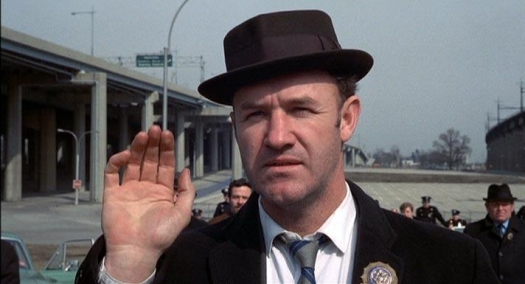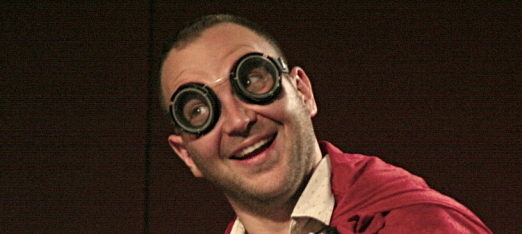SiteMeter Crashes Internet Explorer with 'Operation Aborted'
Last night several of my web sites, including the Drudge Retort, began crashing Internet Explorer with the error message "Internet Explorer cannot open the Internet site ... Operation aborted."
I've encountered this error before, and when it occurs out of the blue on a site you haven't changed, the culprit is usually a problem with third-party Javascript code, as CNet's Clientside blog explains:
IE does this when you attempt to modify a DOM element before it is closed. This means that if you try and append a child element to another and that other element (like the document.body) is still loading, you'll get this error.
To find the error, remove JavaScript widgets one at a time from your site until the error disappears. The culprit here was SiteMeter, which made some recent changes to its code. I've pulled the SiteMeter code until they announce a fix.
'French Connection' Chase Still Thrills
Reader Greg Tutunjian made the following comment in response to a New York Times item about how fight scenes in movies have become increasingly incoherent:
We go to the movies to be entertained, not to observe proper fighting technique. I think the chase (car versus train) in The French Connection would elicit yawns (and a lot of concurrent texting) from today's target audience in a movie theatre.
I recently saw that 1971 film for the first time, wanting to see how Gene Hackman earned his best actor Oscar. Tutunjian's wrong about the car-train chase, which is still an incredible piece of filmmaking that's all the more exciting because of the lack of special effects. The trivia on IMDB contains a lot of great details on the sequence, which included a real car crash. "The man whose car was hit had just left his house a few blocks from the intersection to go to work and was unaware that a car chase was being filmed," according to IMDB. "The producers later paid the bill for the repairs to his car."
Being in the Minority is No Party
TPM Cafe contributor Bill Bishop answers an interesting question:
What happens to political minorities in communities with large political majorities?
They shut up. At book club or in church, they cut short any conversation bordering on politics. A woman in Washington State, a Democrat, told me that as her county grew increasingly Republican, she began to feel "like a second-class citizen, not entitled to have opinions." I interviewed Democrats in one Texas Hill Country town (80% Republican) about a float they built for a July 4th parade. "We got it all ready," said the county Democratic chair, "but nobody wanted to ride." Nobody wanted to be identified as a Democrat in a staunchly Republican community.
Bishop goes on to mention the harassment in staunchly Democratic Austin of a Republican, whose car was egged because of bumper stickers expressing his politics. I've witnessed the same here in Northeast Florida, where it sometimes feels like Democrats are so scarce that we should be a protected species you can visit in zoos. During the 2004 election signs for John Kerry were routinely vandalized and stolen around my neighborhood.
I've never understood how some Americans could be passionate about politics without recognizing the obligation to be respectful of dissent. Some of the worst excesses of government occur when one party has unchecked power over the executive and legislative branches. An aggressive and healthy minority party is essential to the system.
Rivers Cuomo of Weezer Hearts Nirvana
Weezer's new Red Album includes Heart Songs, a song that credits a bunch of musicians who inspired singer Rivers Cuomo and states that Nirvana is the reason his band got started.
The lyrics that give Nirvana's Nevermind its due:
Back in 1991
I wasn't havin' any fun
'Til my roomate said,
"Come on" and put a brand new record onHad a baby on it
He was naked on it
Then I heard the chords
That broke the chains I had upon meGot together with my bros
In some rehearsal studios
Then we played our first rock show
And watched the fanbase start to grow
I heart Nirvana too, but this sappy tribute song is excruciatingly bad and the roster of musicians is bizarre. Gordon Lightfoot, Debbie Gibson, Fresh Prince and Judas Priest?
Looking for a Sign From God
The political blogger Andrew Sullivan has a weird practice of running emails from readers without naming or crediting the sender in any way, which to me makes him look like a spotlight hog. Here's a great one he received yesterday:
I was backpacking about twenty five years ago through Portland, Oregon and stopped to ask directions from a woman putting up marquee letters on a Baptist church sign (some message about Jesus but it was just started so I don't know what she intended to write).
I was looking for directions to a hostel. She was there with her son (I think he was about seven) and said perhaps she could give me a ride, but she had to pray on it. She paused and quietly prayed and then said, no, she could not give me a ride. She did not know where the hostel was. Still, she was pleasant enough, if a bit weird. I thanked her for considering it.
I enjoyed the encounter for its unique strangeness, but I really did not want a ride, so I was secretly relieved. Did God answer my prayer or hers?
Locus Awards Change Rules, Foil Cory Doctorow
Cory Doctorow's short story collection Overclocked was nominated this year for a Locus Award, a science fiction honor voted on by the public and tabulated by Locus magazine. Votes were accepted online, and several links during the balloting on Doctorow's ginormously popular Boing Boing blog helped his book receive the most votes in that category.
But if you check out the award winners, you won't find Doctorow's book on the list. Locus changed the rules after voting was over, deciding to give votes from its subscribers twice as much weight as non-subscribers, as the magazine explained in the print edition of its July issue:
Connie Willis's The Winds of Marble Arch and Other Stories won with a lead of just over 70 points, followed by Jack Vance's The Jack Vance Treasury in second. Cory Doctorow's Overclocked came in third -- despite having the most votes and the most first-place votes. The doubled subscriber votes made Willis, ever a favourite with Locus subscribers, the winner; without the extra points, she would have come in second behind Doctorow, who has a large online fan base.
So the nominee with the most votes and most first-place votes finished third. This quote from Locus comes from a blogger for Vector magazine, who points out that fixing the results didn't stop the magazine from bragging about how many people voted:
The big selling point of the Locus Awards is, or always has been to me at least, their representativeness, precisely the fact that anyone can vote and that they are thus the best barometer of community-wide opinion that we have. As the notes at the start of this year's result somewhat smugly put it, "We get more votes than the Hugo, Nebula, and World Fantasy nominations combined" ... it seems wrong to imply (as I think it's intended to imply) that this legitimizes the results when you've just changed the scoring system to make some voters more equal than others -- particularly if you only make the change after voting has closed, particularly if you only mention it in the print version of the magazine.
Unexpectedly, I couldn't find any mention of this stolen election on Boing Boing.
Credit: The photo of Doctorow was taken by Ed Schipul and is available under a Creative Commons license.
Displaying Twitter Updates on a Web Page
I recently began using Twitter, a microblogging service for posting short, chat-like blog entries and reading what other users of the service are doing. The site has severe reliability problems, but it's still an entertaining way to get real-time updates from bloggers I read along with others I know who've been sucked into Twitter's maw.
I wrote some code to display my most recent Twitter update on my weblog, Workbench, in a sidebar at upper right. This afternoon, I've released the Twitter-RSS-to-HTML PHP script under an open source license. The script requires MagpieRSS for PHP, an open source PHP library that can parse RSS and Atom feeds.
MagpieRSS caches feed data, so at times when Twitter is glacially slow or can't be accessed, this script won't hurt the performance of your server.
The first release of the script only works with a Twitter user's RSS feed, which can be found in the "RSS" link at the bottom of a user's Twitter page. The only tough part about writing the script was creating regular expressions to turn URLs into hyperlinks and "@" references into links to Twitter user pages:
// turn URLs into hyperlinks
$tweet = preg_replace("/(http:\/\/)(.*?)\/([\w\.\/\&\=\?\-\,\:\;\#\_\~\%\+]*)/", "<a href=\"\\0\">Link</a>", $tweet);
// link to users in replies
$tweet = preg_replace("(@([a-zA-Z0-9]+))", "<a href=\"http://www.twitter.com/\\1\">\\0</a>", $tweet);
If you're reading this and wondering why anyone should bother with Twitter, I recommend reading the updates by Jay Rosen, a former university journalism chair who uses the service to share a running dialogue on the media. He punches above his weight in this 140-character-or-less medium.



